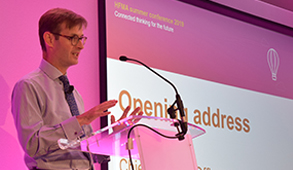Summer conference: Kelly sets out five challenges

Setting out his first challenge, he said the mid-point in the financial year was crucial. ‘I will ask that by in September can you be within 1% - can you get close to nailing your forecast at mid year?
‘At that point in mid September that’s the last moment where you can make sensible and thoughtful adjustments; where you are not taking decisions at the end of the year you could regret because the forecasting wasn’t good.’
At the mid point three years’ ago, capital was underspent by about 20%; the following year it was 18%-19% underspent; and last year it was 10%-15%, he said. ‘That’s several million pounds. If you know in September that you are not going to spend that money, you could do something sensible for the benefit of patients.’
The second challenge was to ‘fire the official starting gun’ to enable the system to begin medium-term planning. ‘We have got to turn the long-term plan into a credible set of actions across the country,’ Mr Kelly said.
Part of this work would be working out how the financial recovery fund will work.
The third challenge – creating the case for additional capital, public health and education funding – would require the NHS to meet the five tests set by the Treasury. These included: getting back into financial balance by 2023/24; delivering cash-releasing productivity; removing unwarranted variations in cost and quality; demonstrating how the service will moderate demand; and showing better use of its capital allocation.
Encouraging collaboration is the fourth challenge. ‘We have to ask how we set a financial system that encourages and incentivises collaboration and joint working at all levels. Collaboration is hard work in my experience – it is far easier to know your responsibilities and keep your head down. Collaboration requires compromise,’ Mr Kelly said.
Joint working with clinicians and other staff was key to reducing unwarranted variations. He said NHS organisations that had succeeded in this had done so by approaching the issue as one of quality improvement with savings following as a result.
He said finance staff must learn to listen to other healthcare professionals. ‘Yes, be great accountants, provide great analysis, but also develop the soft skill of listening. You have got to put yourself in the shoes of the person you are talking to. You can then work out a better way to respond to improve services.’
The final challenge was to make the best use of finance staff and develop their skills. He is keen to work with the HFMA, finance directors and Health Education England to achieve this. ‘The goal I have set myself is to strengthen the networks that already exist to support the training and development of finance staff,’ he explained. Talent development at a local, regional and national level would be part of this work.
He had a question on sharing. ‘To what extend should we continue to share our services?’
He was not necessarily talking about shared services in a traditional sense. ‘If you are going to invest in financial systems it will cost a lot of money. You need to invest in expertise. Not everyone has that money. Let’s have a conversation about where we can join up without compromising individual responsibilities or decision-making powers.’
The final part of the challenge was to promote diversity. While he did not have the answer to how this can be done, he said the business case for introducing greater diversity was overwhelming, and he was determined to work with other national leaders to see what can be done.
Related content
We are excited to bring you a fun packed Eastern Branch Conference in 2025 over three days.
This event is for those that will benefit from an overview of costing in the NHS or those new to costing and will cover why we cost and the processes.